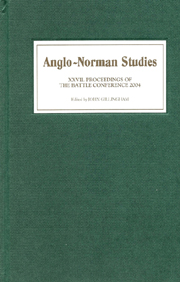Book contents
- Frontmatter
- Contents
- LIST OF ILLUSTRATIONS
- EDITOR'S PREFACE
- ABBREVIATIONS
- Probing the Passions of a Norman on Crusade: the Gesta Francorum et aliorum Hierosolimitanorum
- Gilbert Foliot et l'Ecriture, un exégète en politique
- Writing Warfare, Lordship and History: the Gesta Consulum Andegavorum's Account of the Battle of Alençon
- Anglo-French Peace Conferences in the Twelfth Century
- Peter of Blois and the Problem of the ‘Court’ in the Late Twelfth Century
- Normandy and Norman Identity in Southern Italian Chronicles
- Monastic Chronicles in the Twelfth-Century Abruzzi
- The Impact of Rebellion on Little Domesday
- Setting Things Straight: Law, Justice and Ethics in the Orationes of Lawrence of Durham
- The Angevin Kings and Canon Law: Episcopal Elections and the Loss of Normandy
- Zooarchaeology of the Norman Conquest
- Was Thomas Becket Chaste? Understanding Episodes in the Becket Lives
Writing Warfare, Lordship and History: the Gesta Consulum Andegavorum's Account of the Battle of Alençon
Published online by Cambridge University Press: 12 September 2012
- Frontmatter
- Contents
- LIST OF ILLUSTRATIONS
- EDITOR'S PREFACE
- ABBREVIATIONS
- Probing the Passions of a Norman on Crusade: the Gesta Francorum et aliorum Hierosolimitanorum
- Gilbert Foliot et l'Ecriture, un exégète en politique
- Writing Warfare, Lordship and History: the Gesta Consulum Andegavorum's Account of the Battle of Alençon
- Anglo-French Peace Conferences in the Twelfth Century
- Peter of Blois and the Problem of the ‘Court’ in the Late Twelfth Century
- Normandy and Norman Identity in Southern Italian Chronicles
- Monastic Chronicles in the Twelfth-Century Abruzzi
- The Impact of Rebellion on Little Domesday
- Setting Things Straight: Law, Justice and Ethics in the Orationes of Lawrence of Durham
- The Angevin Kings and Canon Law: Episcopal Elections and the Loss of Normandy
- Zooarchaeology of the Norman Conquest
- Was Thomas Becket Chaste? Understanding Episodes in the Becket Lives
Summary
In December 1118, outside of Alençon in southern Normandy, Henry I suffered one of the few outright military defeats of his long and illustrious career. While the impact of the battle is relatively well-known, the battle itself has received a great deal less attention. On the face of it this relative lack of attention is surprising, for unlike other less well-attested Anglo-Norman battles, the battle of Alençon boasts several contemporary accounts of differing lengths and historical value. Two, namely the entry in the Angevin Annals of Saint-Aubin and a sentence in Suger's Life of Louis VI, are quite short. Two other accounts, however, stemming from Orderic Vitalis's Ecclesiastical History and from one of the redactions of the Angevin Gesta Consulum Andegavorum, are far more detailed. As Hollister, Morillo, Chartrou, and Bradbury have noted, these separate accounts generally complement each other. As a result, on the few occasions that scholars have addressed the battle directly, they have tended to assemble a composite account that blends elements from these separate sources. Indeed, Bradbury, despite being one of the few scholars to note some of the difficulties presented by the Gesta Consulum's version of the battle, was content to present a composite account because, as he said, ‘the basic outline of the Gesta is confirmed by Orderic’. Yet the Gesta's version of the battle is much more problematic than all previous scholars have been willing to admit.
- Type
- Chapter
- Information
- Anglo-Norman Studies 27Proceedings of the Battle Conference 2004, pp. 32 - 51Publisher: Boydell & BrewerPrint publication year: 2005

